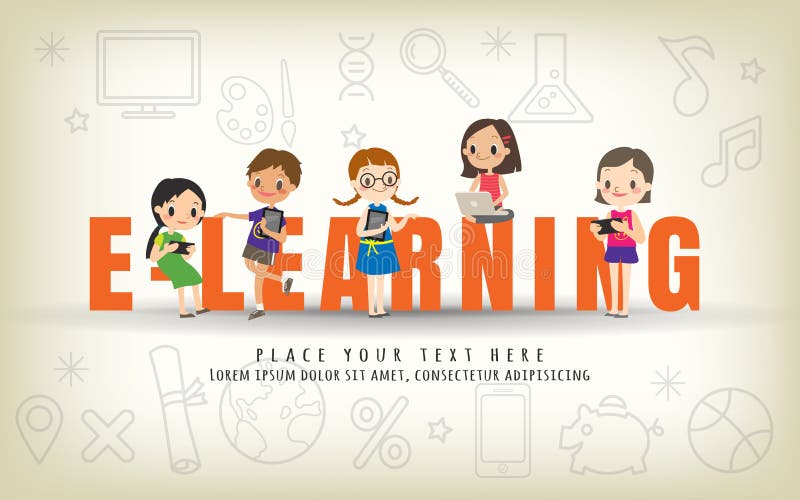The Role of E-Learning in Forming the Future of Education for Children
As traditional education systems develop, the combination of e-learning is arising as a crucial force in shaping the future of education for kids. Recognizing the full extent of this effect calls for checking out the complex effects of e-learning's duty in modern education systems.
Interactive Discovering Atmospheres
In the world of e-learning for kids, interactive discovering atmospheres have actually become crucial devices in boosting educational results. Education and study for children and kids. These electronic platforms incorporate multimedia aspects such as videos, computer animations, and gamified exercises to produce a appealing and dynamic instructional experience. Especially, they transform passive understanding right into an active procedure, consequently promoting better retention and understanding

The combination of collaborative tools additionally permits peer-to-peer communication, which is important for creating social skills and team effort abilities. Virtual classrooms and conversation forums allow pupils to share ideas, ask concerns, and team up on tasks, duplicating the benefits of standard classroom communications. Interactive discovering settings are not just auxiliary educational tools yet essential elements that improve the finding out community for kids. Their duty fit a more efficient and appealing educational landscape can not be overstated.
Customized Education Courses
Using the capacity of personalized education and learning paths changes the discovering experience for youngsters by catering to their one-of-a-kind needs and capabilities. E-learning systems, however, can use innovative algorithms and information analytics to customize educational content, speed, and approaches to each child's particular needs.
Personalized education and learning courses likewise equip teachers by supplying comprehensive insights into student progress. Alternatively, pupils succeeding in specific subjects can advance without being held back by a standardized curriculum.
Furthermore, e-learning platforms can incorporate varied understanding sources, such as interactive simulations, multimedia material, and gamified lessons, to line up with various understanding designs. By fitting visual, auditory, and kinesthetic students, customized education paths ensure that each child obtains the most effective instructional approaches. Education and study for children and kids. Therefore, leveraging customized education paths with e-learning is critical in creating a future-proof, comprehensive, and efficient academic landscape for youngsters
Enhancing Accessibility
While the advantages of tailored education courses are substantial, improving ease of access is equally important to make sure that e-learning systems can get to all children, regardless of their socio-economic history or geographic area. Digital addition is important to link the educational divide and give equitable discovering opportunities. This can be accomplished through the advancement of low-priced, top notch e-learning solutions that are obtainable on diverse gadgets, consisting of smartphones, tablets, and computer systems.
Furthermore, partnerships in between federal governments, non-profits, and economic sectors can assist in the circulation of necessary Recommended Site modern technology and internet access to underserved neighborhoods. Such cooperations can also support the production of local material in numerous languages, making sure social relevance and comprehension.
Furthermore, adaptive discovering modern technologies can be customized to accommodate children with impairments, offering functions like text-to-speech, adjustable text sizes, and interactive elements that satisfy different discovering requirements. These technologies not just equalize education and learning however likewise equip learners by providing tools that satisfy specific obstacles.
Creating Essential Abilities
With access improvements in position, Visit Your URL the following imperative facet to address is the growth of important abilities among young learners. E-learning systems supply an one-of-a-kind chance to cultivate a variety of crucial abilities that standard classroom setups might struggle to address adequately. Amongst these are vital thinking, problem-solving, and electronic literacy, which are increasingly essential in the modern globe.

Furthermore, e-learning systems commonly incorporate collective tools like conversation forums, team projects, and peer testimonials, which promote interaction and teamwork abilities. These systems also subject pupils to a vast range of electronic devices and resources, improving their electronic proficiency. As students navigate various software, apps, and on the internet sources, they come to be adept at using modern technology effectively and responsibly.
Fundamentally, e-learning not just supplements traditional education however likewise outfits students with the vital abilities essential to thrive in an interconnected and significantly digital world.
Conquering Geographical Obstacles
The advent of e-learning has substantially minimized the geographical barriers that typically impeded access to high quality education and learning. Before the digital change, students in remote or underprivileged locations often encountered minimal instructional sources and possibilities. E-learning systems now bridge this gap, providing global accessibility to high-grade instructional material no matter location.
Through on-line courses, online libraries, and interactive tools, pupils from varied geographical backgrounds can engage with the very same educational program used in cosmopolitan institutions. This democratization of education ensures that every child, regardless of their physical place, has the prospective to achieve scholastic success. Moreover, e-learning assists in access to specialized topics and skilled trainers that might not be readily available Read Full Article locally.
Moreover, e-learning allows real-time collaboration in between pupils and educators from different components of the world, cultivating a worldwide knowing area. This interconnectedness not only improves students' educational experiences but likewise prepares them for an extra globalized workforce. By overcoming geographical restraints, e-learning is crucial in developing a comprehensive educational atmosphere where every youngster has the chance to flourish. As a result, the role of e-learning expands past simple benefit; it is a transformative tool that redefines ease of access in education and learning.
Conclusion
E-learning is pivotal in forming the future of education and learning for kids by creating interactive and customized learning settings. E-learning, consequently, stands as a foundation in the development of modern education and learning.
As standard education systems evolve, the assimilation of e-learning is emerging as a critical pressure in forming the future of education for youngsters. Hence, leveraging customized education courses through e-learning is instrumental in developing a future-proof, inclusive, and reliable academic landscape for children.
While the benefits of customized education paths are significant, boosting ease of access is equally vital to make certain that e-learning systems can get to all children, regardless of their socio-economic background or geographic area. The function of e-learning prolongs beyond simple convenience; it is a transformative tool that redefines access in education.
E-learning is pivotal in forming the future of education for youngsters by developing customized and interactive discovering environments.